Strong laxatives. Fast-acting laxatives. Microlax. The most powerful laxative in microenemas.
Various toxic wastes and feces constantly accumulate in the intestines - frequent constipation and bloating occur. An enema is not the only effective laxative for cleansing the intestines. What medications and folk remedies will help cleanse the intestines? What foods have a laxative effect?
The fashion of constantly cleansing the intestines of toxins and waste accumulation is not welcomed by doctors. There are certain indicators for cleansing the intestines:
The type of laxative that most people use regularly and buy without a prescription is the stimulant, which is also considered the most abused. These laxatives work by stimulating the intestinal lining and contracting the muscles of the digestive system while increasing stool hydration. Over time, they can actually impair the body's natural ability to go to the bathroom, so they pose a risk for "laxative addiction."
Other types of laxatives are osmotic and hyperosmolar laxatives, which are hydrating agents that introduce fluids into the intestines. An enema is a type of laxative inserted into the rectum so it can directly apply saline.
- before certain types of bowel examination;
- before surgery;
- in case of severe intoxication, food or chemical poisoning;
- in case of constant constipation;
- during the treatment of helminthiasis.
Important! If constipation is treated haphazardly, the condition will worsen significantly. Constant forced stimulation of the intestines will lead to the fact that it will become sluggish and it will be difficult for it to empty itself.
Glycelax - the best suppositories for constipation for babies
"Bulfillers" are types of fiber treatments that are mild laxatives most doctors recommend to patients first to increase slow transit time. Laxative lubricants work by making the stools "slippery," usually with mineral oils that coat the intestinal walls and prevent drying. It's important to understand that while over-the-counter or prescription laxatives may help relieve a case of short-term constipation, they do not ultimately resolve any digestive problems.
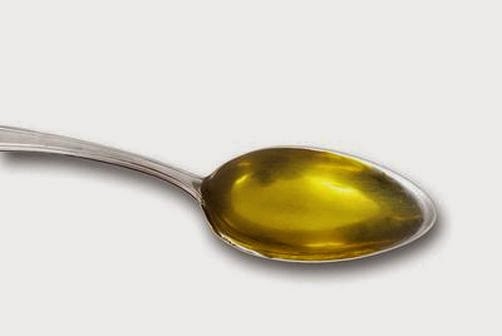
The intestines need to be periodically cleansed by people who mainly consume thermally processed foods, animal products, fatty and fried foods, energy and alcoholic drinks. The procedure should be done for sedentary people and city residents.
Why are some laxatives dangerous?
In fact, they can make the problem worse, cause many unwanted and dangerous side effects, and even become addictive as the body begins to rely on them over time to function normally! While laxative abuse has occurred for many years, today we are seeing more cases of laxative "purging" than ever before. People who consider themselves healthy and "normal eaters" may use laxatives every week or even several times a week to control their weight.
Why shouldn't you take even natural laxatives all the time? Drugs that thin the stool can cause a violation of the water-salt balance in the body. Often a deficiency of nutrients develops - they do not have time to be absorbed from food.
It is strictly forbidden to take laxatives during an exacerbation. inflammatory processes in the digestive system, intestinal obstruction. These drugs are contraindicated if uterine bleeding and fever.
In an era when up to 80 percent of women and a high percentage of men are actively trying to control their food intake and worry about gaining weight, laxatives have embraced a certain appeal as a "quick fix." People mistakenly believe that they can avoid some "calorie absorption" from the foods they eat, but this is not true for the most part, and can actually lead to many dangerous side effects.
Sennosides A and B
Health problems associated with laxative abuse include. When taking laxatives, you often have to deal with serious complaints about the gastrointestinal tract. The renin-aldosterone part of the digestive system is activated when laxatives are taken, resulting in fluid loss. The body shrinks, retaining all the available water it can get, leading to swelling and short-term weight gain, even slowing your metabolism after you stop taking the laxative.
Children, the elderly, and women during pregnancy and menstruation should take laxatives with caution.
Why are laxatives better than enemas? Medicines cleanse all parts of the intestines, they are easier and more comfortable to use, and it is easy to calculate the required dosage.

The effects of laxative use usually leave people in a panic because they suddenly feel uncomfortable, very bloated from carrying excess liquids in the digestive tract and may be unable to go to the bathroom normally. For some people, this leads to continued use of laxatives to force the body to shed water and resolve any constipation rebound symptoms.
Over-the-top lube or fillers also usually come with some not-so-pleasant side effects. Fiber works by increasing the water content and bulk of stool so it can move quickly through the colon. Naturally, it's great for this purpose, but people who dramatically increase their fiber may suffer from cramping, bloating, or gas. Too much synthetic fiber or excessive use of mineral oils from laxatives can also reduce your body's absorption of certain drugs and medications.
Main types of laxatives
Laxatives affect the intestines in different ways. Depending on the mechanism of action, they are divided into several groups.
Osmotic and salt preparations - retain water inside the intestine and act on all parts of the intestine. The composition contains components that draw water into the intestines and liquefy solid feces - Duphalac, Moviprep. This group includes magnesia and Carlsbad salt. Bowel movement occurs within 3–6 hours. Possible adverse reactions are disturbances in water metabolism.
What to use instead: Foods that improve digestive function
Another concern is that lube laxatives can absorb fat-soluble vitamins from the intestines and reduce certain nutrient levels. Our bodies have an amazing natural ability to cleanse and detoxify on their own - we just need to provide the right nutrients and hydrating fluids. Low intake of water and nutrients can lead to a buildup of toxins in our bodies because the digestive tract becomes dry while the liver and kidneys, major organs, slow down in functioning.
Important! Advantages: mild laxatives are not addictive. Saline laxatives are classified as transit drugs - after taking the intestines rapidly empty, the stool is liquid.
Drugs that increase intestinal volume based on fiber and pectin. The products are designed to cleanse the small and large intestines. Doctors recommend using them for constipation and poisoning; fiber has the ability to neutralize heavy metals and toxic waste:
Without enough magnesium, it's difficult to move stool through your system, especially since magnesium is a natural muscle relaxant that can help stop abdominal cramps. If you notice increasing results in your stools becoming too loose and watery, you can adjust your intake to its comfort level and get back to normal.
Do you have difficulty having bowel movements? Well, this is due to the solidification of waste in your body, which made the evacuation process very painful. This condition is known as constipation and can affect anyone regardless of their age. When the muscles of the digestive tract become dry, they contract and stop the passage of waste. Constipation can be chronic, and there are other causes that are equally responsible, such as stress, pregnancy, poor eating habits, hypothyroidism, colon cancer, multiple sclerosis and excessive consumption of strong medications.
- Metamucil;
- Citrosept;
- bran, flax seeds.
The therapeutic effect occurs after 9 hours.
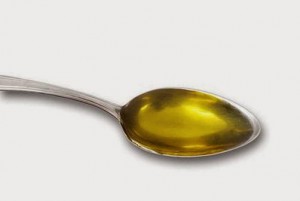
Means that stimulate peristalsis - preparations based on senna leaves, buckthorn, Guttalax. They have an effect exclusively on the large intestine and are used instead of an enema. They begin to act after 6 hours. Possible side effects include cramps and stomach pain; with prolonged use, diarrhea and dehydration may occur. Castor oil has a similar effect, but it can only cleanse the small intestine.
The first sign of constipation is difficulty passing stool. Other symptoms include vomiting, abdominal pain and swelling, stiff faces and loss of appetite. While a severe case of constipation will need some medical attention. There are ways to prevent and treat this at home using natural laxatives.
Castor oil is the best laxative for constipation in adults as well as for children. Mix 1 tablespoon castor oil with warm milk and get it at night before you hit the bag. Alternatively, you can warm 1 tablespoon castor oil and mix it with 1 tablespoon honey.
Oil laxatives based on petroleum jelly, fennel and almond oil, paraffin. One of the fastest laxatives, they work within 4 hours. They are used in cases where a person cannot strain the abdominal walls too much. Long-term use disrupts the absorption of certain vitamins.
Important! Salt preparations can be used independently without a doctor’s prescription no more than once every 4 weeks.
Olive oil helps improve the digestive system and bowel movements. Mix olive oil With lemon juice and drink it at least once a week. Lemons help a lot when it comes to colon cleansing. Squeeze a lemon into one glass of water and drink it every morning.
Microlax. The most powerful laxative in microenemas
Water - best way treatment of constipation. Drink a glass of warm water every morning before brushing your teeth. Indian gooseberry is very effective in improving the digestive system. Mix 1 tablespoon of Indian gooseberry powder in a glass of warm water and have it on an empty stomach in the morning or you can drink it in the evening before dinner.
Laxatives are available in tablets, drops, suspensions, and suppositories. Liquid laxatives and suppositories are used in the treatment of children and the elderly.

In some cases, the speed of action medicinal product has great value. Fast-acting drugs are often used before surgery; they are of artificial and natural origin.
Caffeine, which is found in coffee, is a natural stimulant. However, this is not necessary for everyone. Therefore, you should try other laxatives before trying coffee. Pregnant women suffering from constipation should eat raisins daily as they are good source fiber. Soak the raisins in a bowl of water overnight and have them the next day on an empty stomach.
Add a few figs to a cup of milk and boil them. Drink this warm fig milk before you hit the hay. Aloe vera can have the opposite effect if used in excess. Mix 2 tablespoons of aloe vera gel in any fruit juice and drink it regularly.
Lavacol
Lavacol - the drug is produced in the form of disposable sachets, each of which contains 14 g of powder. One sachet should be diluted in 250 ml of water; for effective cleansing, you need to drink at least 3 liters of the solution. You need to drink 250 ml of medicine at intervals of 20–30 minutes. After such a bowel cleansing, you need to refrain from eating for 24 hours.
Signs of chronic constipation include
Blackstrap molasses is rich in vitamins and minerals such as magnesium, which provides instant relief from constipation. Mix 2 teaspoons in a glass of warm water and drink. Guava seeds are rich in fiber; Therefore, they provide a huge respite from constipation.
Organic and mineral oils
Bananas with high content potassium and fiber. This quality makes them the best laxatives as they help keep our body's electrolytes in balance. They promote the growth of good bacteria, which promote bowel movement. This remedy has been used for centuries. Mix 1 teaspoon of ghee in a glass of warm milk and drink every night before you clean up.
Fortrans
Fortrans is an effective and strong laxative, it is often used before various examinations of the stomach and intestines. The drug retains moisture and does not disturb the water-salt balance. The product is produced in powder form, which is packaged in individual sachets. One package should be diluted in 1 liter of water, the resulting solution should be divided into 3 parts, and drunk at intervals of 1 hour. Bowel movement occurs after about 5 hours.
Spinach is ideal for cleansing the intestines. In fact, it acts as a purifier to eliminate all the waste produced in our bodies. You can get it in liquid form or as juice, mixed with water or cooked or raw. Prunes are high in vitamin A and potassium. In addition to treating constipation, they also lower cholesterol and reduce the risk of cancer and heart disease. Adults should eat 5 prunes a day, and for children, make juice by mixing it with a little water.
Cabbage helps soften stools and also in colon cleansing as it is rich in fiber. Include raw cabbage in your meals as coleslaw or lettuce. You can eat cooked cabbage in soup form. Oranges help flush toxins from your body. Eat at least two oranges a day. This whitish husk has fibers that are soluble and insoluble. The insoluble husk expands in the stomach, improving intestinal function. Mix two tablespoons of Isaggol with any fruit juice, milk or water and drink at night.

Castor oil
Castor oil is the best, fastest-acting laxative. It is necessary to refrain from eating 6 hours before taking the medicine, and not to eat for the same number of hours after. The medicine is calculated depending on body weight - 1 g/kg. To speed up the effect, castor oil should be washed down with lemon juice, the volume of which is 2 times the dose of the medicine. Adverse reactions - feeling of nausea. The cleansing effect occurs within 2 hours.
Yogurt improves the digestive system. This good reason when eating 1 cup of yogurt every day. You can also have buttermilk made from yogurt. Beans are a good source of fiber and help in treating constipation. Dandelion is a detoxifier and natural laxative. Drink a cup of dandelion tea once a day to relieve constipation.
Grate some ginger and add it to your regular tea. He kills anyone bad bacteria present in the stomach. Sesame helps in bowel movement. Have 3 teaspoons every day in the morning or sprinkle it on your salad. Do not use more than this amount.
Senna
To cleanse the intestines, you can use senna leaves; they are sold in pharmacies in the form of dried raw materials or special preparations. The names of senna-based medicines are Senade, Senadexin. Senadexin should be taken 1 tablet per day for 3 days.

Soft remedies
The main difference between mild laxatives is effective cleansing, minimum quantity contraindications and adverse reactions.
List of mild laxatives:
- Magnesium sulfate is a powerful laxative that activates intestinal motility. The product is safe, but necessary preliminary preparation. For three days you need to stop eating fried, fatty, salty and spicy foods, reduce the amount of salt and sugar in your diet. Magnesia is sold in powder form - 20 g of the product should be dissolved in 100 ml of warm water, it is better to drink it in the morning. The drug will begin to act in an hour. Disadvantage: bitter, unpleasant taste.
- Polysorb is a sorbent and can only be taken in the form of an aqueous solution. The amount of the drug is calculated based on the age and weight of the patient.
- Activated carbon is a natural sorbent that binds and removes harmful and toxic substances. The standard dosage regimen is 1 tablet per 10 kg of weight. You need to take the medicine twice a day for 5–7 days.
- Duphalac - the drug is produced in the form of powder or syrup. Has a cleansing effect on the large intestine. The main difference is that dysbacteriosis does not develop after taking it, it promotes the production beneficial bacteria. Dose medicine calculated individually, it should be taken before breakfast for 3-5 days. During treatment, be sure to drink at least 2 liters of clean water.

Important! Duphalac contains lactose and fructose, so the drug is prohibited for people who are prone to allergic reactions to these substances.
Inexpensive means
Problems with constipation are relevant for older people, so they are looking for effective and cheap laxatives. Budget laxatives are mainly represented by irritant drugs. They quickly help cope with constipation, but cannot be used for a long time.
List of inexpensive cleansing products:
- Senadexin No. 10 – price within 20 rubles;
- Magnesium sulfate – cost 45 rubles;
- Bisacodyl – price ranges from 35–40 rubles;
- Picolax – price 107 rub.
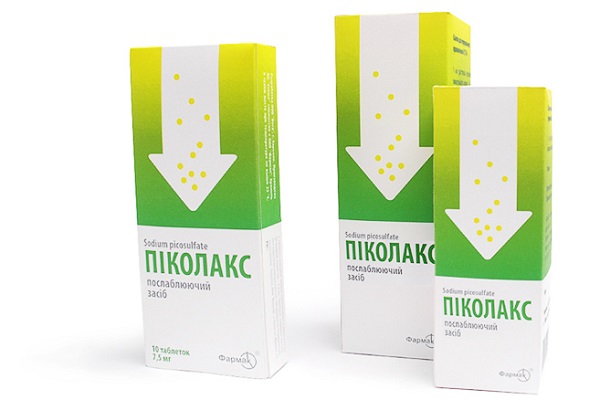
Before surgery and colonoscopy, the intestines should be completely cleansed to minimize the risk of various complications. The laxative before colonoscopy is taken in fractions - 2 liters of solution should be drunk the day before the procedure, another 2 liters 6 hours before the colonoscopy.
Effective preparations for cleansing before bowel examination or surgery:
- Based on macrogol - Fortrans, Lavacol, Forteza. The drugs retain fluid in the intestines; you need to drink 4 liters of 250 ml solution per day per day. Disadvantages - salty taste, not everyone can drink such a large volume of medicine, additional anti-nausea medications may be required.
- Drinking sodium phosphate - Fleet, Phospho-soda. The drugs draw water from the blood into the stomach. The dose of the drug should be dissolved in 240 ml of water, followed by 500 ml of warm water. It is tedious to take 2 doses of medicine within 10-12 hours. Adverse reactions - dehydration, kidney dysfunction.
- Medicines based on sodium citrate - Microlax. They soften the stool, the therapeutic effect occurs within a quarter of an hour. The drug is used as an additional remedy for severe constipation.
In addition to these remedies, you can use drugs that act more gently but more slowly. Duphalac and Normaze should be taken 7 days before surgery or colonoscopy.

Laxatives for children and pregnant women
The basic rule for choosing a product for children and pregnant women is that it must be absolutely harmless. A laxative should be given to children if there is no bowel movement for 2-3 days, or if there are problems with bowel movements.
- Pediatricians recommend giving newborns Creon, Linex, Plantex, Espumisan to normalize the functioning of the digestive system, doing massage and gymnastics.
- To eliminate constipation in children from birth, you can use Duphalac in the form of syrup. This drug is also recommended for pregnant women.
- Children's Forlax can be used to treat children older than 6 months. Children under one year old can be given 1 sachet per day, over 12 months - 1-2 sachets per day.
- Prelax is prescribed based on age. Up to 12 months - 10 ml per day, from 1 year - 15 ml. The drug acts gently and is not addictive.
During pregnancy, constipation in women often occurs due to hormonal changes in the body, pressure of the uterus on internal organs. Doctors recommend resorting to laxatives during this period in extreme cases, if traditional methods and food does not bring relief.
Pregnant women should not use salt and oil laxatives. It is allowed to use only lactulose-based drugs - Duphalac, Prelax, Forlax.

Important! Diet and exercises for pregnant women will help avoid problems with intestinal function.
Folk laxatives
A laxative for colon cleansing at home is prepared from various herbs and plants that have a laxative effect.
Homemade rowan laxative is a gentle and effective cleanser.
How to cook:
- The berries should be collected before the first frost and placed in a 1 liter glass container.
- You need to cover the rowan berries with sugar - the layers should be approximately the same.
- Cover the container with gauze, place in the sun, wait until the sugar is completely dissolved.
- Place the jar in a dark room for 3 weeks, making sure that the fermentation process does not begin.
- Strain, add alcohol at the rate of 25 ml per 500 ml of syrup.
Take 15 ml in the morning before breakfast.
To prepare laxative teas, you can use the following herbs - yarrow, dandelion leaves, licorice or nettle, hay or buckthorn bark. To prepare the drink you need 1-2 tsp. crushed raw materials, pour 250 ml of boiling water, cool in a closed container. Drink 3-4 times a day.

What foods have a laxative effect?
Homemade colon cleansing includes not only folk remedies, but also the use of certain foods.
- The best herbal laxative is olive oil. It improves bowel function; it should be taken 10–15 ml every morning before the first meal.
- A good herbal laxative is fresh seasonal vegetables and fruits, bran, sprouted grains, pumpkin seeds and pulp, prunes.
- Flax seeds in combination with kefir quickly and gently cleanse the intestines. Grind 15 g of seeds, pour 220 ml of low-fat kefir, drink instead of dinner.
Fresh vegetable salad effectively removes unnecessary deposits from the intestines. Wash and grate turnips, celery, cabbage, carrots, and beets. All ingredients must be taken in equal quantities, mixed, and eaten without any dressing. You can use all vegetables, or choose 2-3 according to the season.
Constipation is an unpleasant and painful condition, to avoid it, you need to cleanse the intestines in a timely manner. Folk remedies and products will help you do this as safely as possible. If constipation recurs frequently, surgery or a colonoscopy is planned - the doctor will select the best and safest medications.
Those who experience regular stool retention know various laxatives for constipation at home.
A number of common foods that are included in the daily diet have a laxative effect.
Reasons
Constipation may occur during pregnancy. This is due to:
- increased levels of progesterone in the blood of a pregnant woman, which relaxes the uterus and other organs with smooth muscles;
- a unified neurohumoral system (with the help nervous system and body fluids: lymph, blood, tissue fluid) regulation of the uterus and parts of the large intestine.
Plant fiber is necessary for the human intestines for mechanical cleaning of undigested food debris. A sufficient amount of water allows feces to move through its lumen without hindrance.
In infants constipation may be associated with imperfect nervous regulation of the pelvic organs. Such constipation disappears in the second month of life.
Adults suffer from constipation due to disorders of the intestinal microflora, inflammatory processes of the gastrointestinal tract (duodenitis, pancreatitis, cholecystitis), diseases anus(proctitis, hemorrhoids, paraproctitis).
In old age constipation occurs due to decreased intestinal motility (contractions), decreased volume of food and liquid intake, decreased mobility, and as a side effect of certain medications.
Vegetable oils and liquid paraffin
Perhaps the most effective and affordable remedy for constipation is oil. If we talk about plant products, then the following will cope with the elimination of feces from the intestines:
- sunflower;
- linen;
- olive;
- pumpkin;
- sea buckthorn;
- mustard;
- castor
Vegetable oil can be added to porridges, main courses, kefir or yogurt.
The most popular mineral oil is Vaseline (liquid paraffin). It is widely used for various medical purposes, including for oral administration (orally, vaginally, rectally).
Sunflower oil
 For constipation, you need to drink 1 tbsp. l. oils on an empty stomach, an hour before breakfast. The oil coats the entire gastrointestinal tract and promotes the movement of feces through the intestines. Has virtually no contraindications, and allergic reactions from its use develop extremely rarely.
For constipation, you need to drink 1 tbsp. l. oils on an empty stomach, an hour before breakfast. The oil coats the entire gastrointestinal tract and promotes the movement of feces through the intestines. Has virtually no contraindications, and allergic reactions from its use develop extremely rarely.
There are no restrictions on the reasonable use of sunflower oil by pregnant and lactating women. It is safe for children.
Linseed oil
 It helps well with chronic constipation: take a couple of spoons at night. Flaxseed oil provokes the release of bile into the lumen of the duodenum. Therefore, if you have diseases of the bile ducts, taking flax oil is not recommended.
It helps well with chronic constipation: take a couple of spoons at night. Flaxseed oil provokes the release of bile into the lumen of the duodenum. Therefore, if you have diseases of the bile ducts, taking flax oil is not recommended.
It contains phytoestrogens, which increase the level of female hormones (estrogens), and during pregnancy can cause miscarriage or premature birth.
Flaxseed oil has a weak irritating effect and its use is undesirable when:
- gastritis;
- duodenitis;
- cholecystitis;
- pancreatitis;
- colitis.
For children, it is good to mix a couple of teaspoons of flaxseed oil with cereals or purees, but it is not recommended before the age of three.
Olive oil
 It is also widely used to resolve delicate problems with defecation, used to normalize liver function (bile release) and as a healing agent for peptic ulcers of the stomach and duodenum. The oil is better absorbed when exposed to citric acid. Therefore, after taking a spoonful of oil in the morning, you can drink half a glass of warm water with lemon.
It is also widely used to resolve delicate problems with defecation, used to normalize liver function (bile release) and as a healing agent for peptic ulcers of the stomach and duodenum. The oil is better absorbed when exposed to citric acid. Therefore, after taking a spoonful of oil in the morning, you can drink half a glass of warm water with lemon.
Olive oil, taken on an empty stomach, can comprehensively restore the body, forcing the stomach and intestines to work correctly and harmoniously. Olive oil has a healing effect, so its use is effective for anal fissures.
There are also contraindications: pathological location of the bile ducts and ducts, obesity, cholecystitis, allergies. Good for preventing constipation during pregnancy.
Pumpkin oil
 It has almost no contraindications, therefore it is used without fear by pregnant women and is suitable for infants. It has anthelmintic properties, i.e. it helps get rid of worms.
It has almost no contraindications, therefore it is used without fear by pregnant women and is suitable for infants. It has anthelmintic properties, i.e. it helps get rid of worms.
To treat helminthiasis and to achieve a laxative effect, take 1 tsp of flaxseed oil. 3 times a day before meals (20-30 minutes), no more than 10 days in a row, and three weeks later repeat the course.
An interesting recipe for constipation: ⅓ glass of yogurt, 1 tbsp. l. pumpkin oil, 1 tsp. honey Mix and drink before bed.
Sea buckthorn oil
It's rarely found on store shelves, but it's easy to make yourself. Fresh berries Sea buckthorn is ground with a wooden masher in an enamel bowl, and the juice is squeezed out of the resulting mass. It is placed in a warm, cool place (refrigerator) for a day, after which the oil film formed on the surface is carefully removed with a spoon. Take 2.5 ml 2 times a day - morning and evening. Copes well with inflammatory diseases of the gastrointestinal tract.
Rectal suppositories with sea buckthorn oil are often prescribed to pregnant women and young children.
Mustard oil
 Like pumpkin, mustard oil is effective against helminthic infections, an excellent antiseptic and immunomodulator. Effective for inflammation of the gastrointestinal tract and helps improve intestinal motility. Safe for children provided there are no intolerances or allergies.
Like pumpkin, mustard oil is effective against helminthic infections, an excellent antiseptic and immunomodulator. Effective for inflammation of the gastrointestinal tract and helps improve intestinal motility. Safe for children provided there are no intolerances or allergies.
Mustard oil enhances the production of gastric juice and bile, this helps improve digestion and prevents constipation. Since intestinal motility increases, mustard oil is effective for atonic constipation.
Contraindicated in case of increased acidity and ulcerative processes.
Castor oil
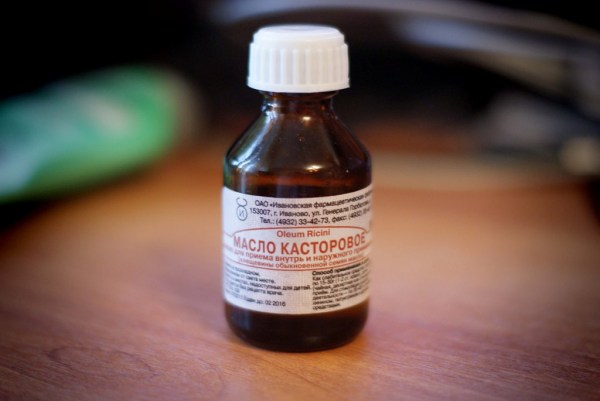 Unlike most other vegetable oils, the effect of castor oil is due to its irritating effect on intestinal receptors. Often used in the treatment of chronic constipation complicated by hemorrhoids.
Unlike most other vegetable oils, the effect of castor oil is due to its irritating effect on intestinal receptors. Often used in the treatment of chronic constipation complicated by hemorrhoids.
Castor oil causes the intestines to get used to constant artificial stimulation, so long-term treatment is not recommended (no more than three days in a row).
Castor oil has an unpleasant taste, but it can be washed down with warm drinks:
- tea (black or green);
- milk;
- ginger drinks.
Vaseline oil
 Viscous mineral oil, unlike organic vegetable oils, is not absorbed either in the stomach or intestines. Forms a thin oily film in the intestines, ensuring the softening of stool and their easy passage.
Viscous mineral oil, unlike organic vegetable oils, is not absorbed either in the stomach or intestines. Forms a thin oily film in the intestines, ensuring the softening of stool and their easy passage.
Liquid paraffin is hypoallergenic, therefore it is used for very young children and is not contraindicated during pregnancy. It should be taken 2 tbsp. l. (1 tsp for children) 1-2 times a day 2 hours before meals.
All types of oil are suitable for rectal use, i.e. for administering therapeutic microenemas.
Enemas are often more effective and work faster than regular therapy, but do not eliminate the causes of constipation.
Laxative herbs
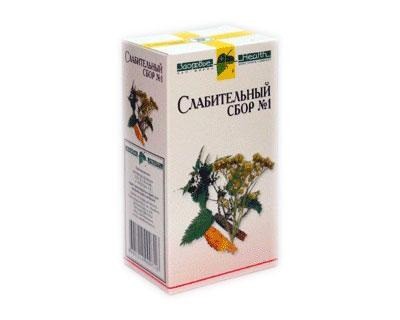 If the question arises of how to make a laxative at home, then you need to pay attention to laxative herbs:
If the question arises of how to make a laxative at home, then you need to pay attention to laxative herbs:
- Senna grass, or cassia acufolia. Quite well tolerated and relatively safe for pregnant and lactating women. People with gallbladder diseases should treat the plant with caution.
- Buckthorn(zhoster laxative) contains substances that enhance intestinal motility without irritating its lining. They use decoctions and infusions (water and alcohol) from the fruits of joster, which have a mild laxative effect. Buckthorn bark is also used, but it cannot be kept less than a year, and fresh ones contain substances that cause vomiting. Contraindicated during pregnancy, and with prolonged use it causes intestinal addiction.
- Rhubarb. Rhubarb roots have an irritant effect, which produces a laxative effect. Along with the laxative effect, it can have an astringent effect, so you need to be careful with the dosage. Mostly water infusions and decoctions are used as a laxative. Suitable for nursing and pregnant women.
- Turn, or prickly plum, is a distant ancestor of the cultivated plum and has a similar laxative effect. They use flowers that are collected and dried. Water infusions and decoctions are used. The berries are used to make compote, jelly, jam and marmalade, but they have an astringent effect and are recommended for digestive disorders and various intestinal infections.
- Licorice(licorice). Contains mucous substances and gum, used as an expectorant and laxative. Included in the “Complex Malt Root Powder” along with senna leaves, fennel fruits and sulfur.
- Stalnik field and preparations from it are used as a laxative. They relieve sphincter spasms and increase the tone of the intestinal walls. Tinctures are made from it or decoctions are prepared and used for rectal fissures.
- Toadflax and extracts from it are used for atonic constipation, stimulating increased intestinal motility. It is not recommended for use by pregnant women, because it has a stimulating effect on the smooth muscles of the uterus and can cause miscarriages.
- Althea. Its roots contain large number bioactive mucus, which envelops the intestines, relieves inflammation and helps eliminate constipation. Used for colitis.
Carminative herbs that promote the release of gases from the intestines are relevant for constipation: fennel, anise, caraway.
Some herbs have a choleretic effect and help improve stools and eliminate constipation by stimulating bile production: dandelion root, yarrow, flax seeds.
Helps well laxative tea , prepared from one or more well-combined herbs. You can find it in pharmacies laxative collection No. 1, consisting of buckthorn bark (50%), nettle leaves (33.3%) and yarrow herb (16.7%). Sold in filter bags, which is very convenient for brewing. Laxative collection No. 2 consists of senna leaves, bark and buckthorn fruits with the addition of anise and licorice root.
Fruits and berries as a laxative
Fruits, berries, vegetables and root vegetables contain a lot of plant fiber, which is necessary for proper digestion. A sufficient amount of fiber in food is the key to a healthy intestine and regular bowel movements. Products with a laxative effect are especially important during pregnancy, when expectant mother thinks about what kind of laxative you can use during pregnancy.
Dried fruits: prunes, figs, dried apricots
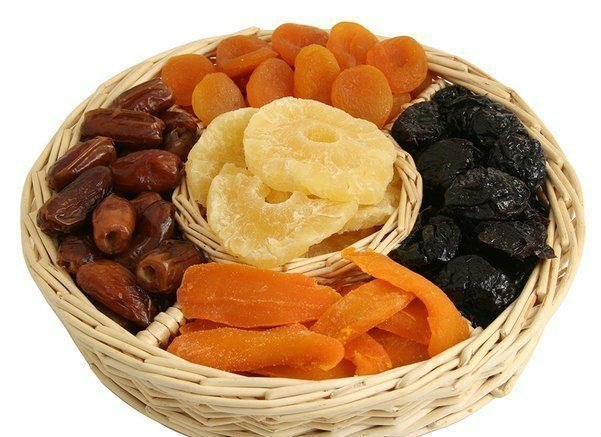 Dried fruits help normalize digestion and are available at any time of the year. Prunes and dried apricots can be eaten in their pure form, or you can prepare jelly and compotes. Figs are best consumed dried, without any additional processing.
Dried fruits help normalize digestion and are available at any time of the year. Prunes and dried apricots can be eaten in their pure form, or you can prepare jelly and compotes. Figs are best consumed dried, without any additional processing.
From various dried fruits you can make special sweets that are convenient to take with you to work, school or a walk.
Plum
They have a diuretic and choleretic effect, improves intestinal motility. In the morning, as your first breakfast, you can eat 10-15 fruits or drink a glass of plum juice. Plum and its juice are not recommended for young children because they can cause flatulence and diarrhea.
Plum can be regarded as a fast-acting laxative, since the effect appears after 2-4 hours.
Cherry and kiwi
 Not everyone benefits from kiwi, but some note its laxative properties, especially for children’s bodies. One or two fruits in the evening before bed can normalize intestinal motility and secrecy.
Not everyone benefits from kiwi, but some note its laxative properties, especially for children’s bodies. One or two fruits in the evening before bed can normalize intestinal motility and secrecy.
Cherry has a laxative effect and stimulates intestinal motility.
Beet
Beets have a lot of fiber, so they mechanically clean out undigested food debris. Beets and their fibers provide a nutrient medium for microorganisms that inhabit the intestines, which also contribute to the formation of normal stool. This is a reliable and simple laxative at home with fast action.
Folk remedies
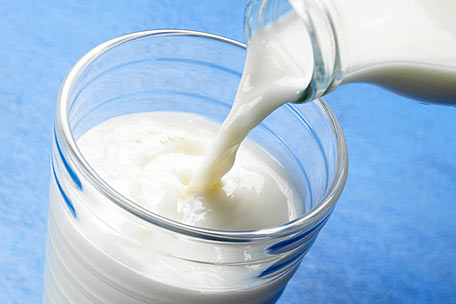 There are some folk remedies for constipation that are surrounded by rumors:
There are some folk remedies for constipation that are surrounded by rumors:
- milk with cucumber;
- herring with milk;
- a mixture of boiled and unboiled water.
In these cases, everything depends on the acidity of the stomach and intestinal microflora. Some people’s digestive organs are capable of “digesting nails,” while others suffer from various kinds of disorders for life. Individual characteristics of digestion can only be verified experimentally by trying it on yourself. When using folk laxatives, get ready for flatulence, increased peristalsis and diarrhea.
Treatment with soda has been known for a long time. Some treat belching, others treat high acidity, and still others treat oncology. For some, baking soda helps with constipation. A consultation with a doctor is necessary, after which you will know whether this treatment is suitable for you or not. Take soda in small portions (⅕ tsp) on an empty stomach, diluting it in warm water or milk. Saline laxative is suitable for one-time use.
Coffee- it is not a laxative, but due to the contents it contains organic matter it is able to enhance intestinal motility, promoting bowel movements. Caffeine does not in any way affect the ability of the intestines to empty, because according to the observations of doctors, decaffeinated coffee has a more pronounced effect.
The most proven way to combat constipation is. It helps to improve the functioning of all digestive organs, is easily digestible, and there are no side effects. Fresh kefir is useful for constipation, and left in the refrigerator for 1-3 days has a strengthening effect. To normalize stool, it is enough to drink one glass of kefir in the morning and evening.
Constipation is a consequence of any disturbance in secrecy, motility or intestinal microflora. You can take laxatives, give enemas, stick to a vegetable or fruit diet, but you need to find out the cause and fight it first of all.









